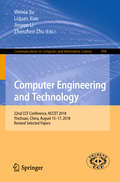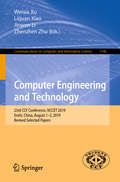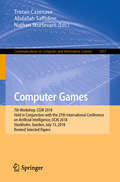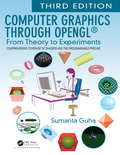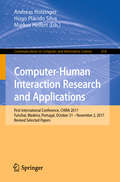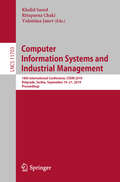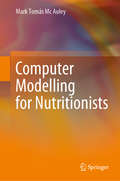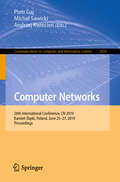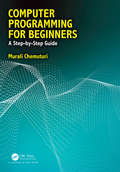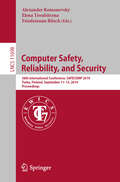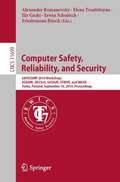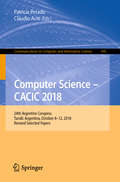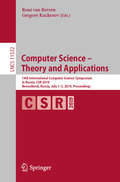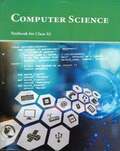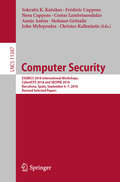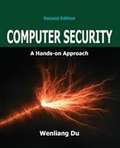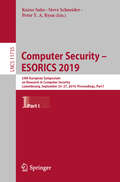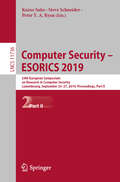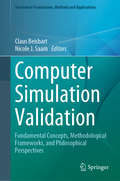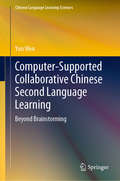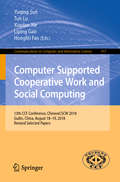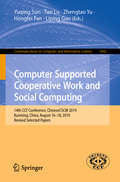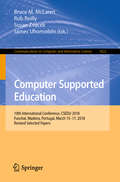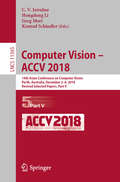- Table View
- List View
Computer Engineering and Technology: 22nd CCF Conference, NCCET 2018, Yinchuan, China, August 15–17, 2018, Revised Selected Papers (Communications in Computer and Information Science #994)
by Weixia Xu Liquan Xiao Jinwen Li Zhenzhen ZhuThis book constitutes the refereed proceedings of the 22nd CCF Conference on Computer Engineering and Technology, NCCET 2018, held in Yinchuan, China, in August 2018.The 17 full papers presented were carefully reviewed and selected from 120 submissions. They address topics such as processor architecture; application specific processors; computer application and software optimization; technology on the horizon.
Computer Engineering and Technology: 23rd CCF Conference, NCCET 2019, Enshi, China, August 1–2, 2019, Revised Selected Papers (Communications in Computer and Information Science #1146)
by Weixia Xu Liquan Xiao Jinwen Li Zhenzhen ZhuThis book constitutes the refereed proceedings of the 23rd CCF Conference on Computer Engineering and Technology, NCCET 2019, held in Enshi, China, in August 2019. The 21 full papers presented were carefully reviewed and selected from 87 submissions. They address important and emerging challenges in the field of computer engineering and technology.
Computer Games: 7th Workshop, CGW 2018, Held in Conjunction with the 27th International Conference on Artificial Intelligence, IJCAI 2018, Stockholm, Sweden, July 13, 2018, Revised Selected Papers (Communications in Computer and Information Science #1017)
by Tristan Cazenave Abdallah Saffidine Nathan SturtevantThis book constitutes revised selected papers from the 7th Workshop on Computer Games, CGW 2018, held in conjunction with the 27th International Conference on Artificial Intelligence, IJCAI 2018 in Stockholm, Sweden, in July 2018.The 8 full papers presented in this volume were carefully reviewed and selected from 15 submissions. They cover a wide range of topics related to video games; general game playing.- machine learning and Monte Carlo tree search.
Computer Graphics Through OpenGL®: From Theory to Experiments
by Sumanta GuhaCOMPREHENSIVE COVERAGE OF SHADERS AND THE PROGRAMMABLE PIPELINE <P><P> From geometric primitives to animation to 3D modeling to lighting, shading and texturing, Computer Graphics Through OpenGL®: From Theory to Experiments is a comprehensive introduction to computer graphics which uses an active learning style to teach key concepts. Equally emphasizing theory and practice, the book provides an understanding not only of the principles of 3D computer graphics, but also the use of the OpenGL® Application Programming Interface (API) to code 3D scenes and animation, including games and movies. The undergraduate core of the book takes the student from zero knowledge of computer graphics to a mastery of the fundamental concepts with the ability to code applications using fourth-generation OpenGL®. The remaining chapters explore more advanced topics, including the structure of curves and surfaces, applications of projective spaces and transformations and the implementation of graphics pipelines. This book can be used for introductory undergraduate computer graphics courses over one to two semesters. The careful exposition style attempting to explain each concept in the simplest terms possible should appeal to the self-study student as well. <P><P> Features <br>• Covers the foundations of 3D computer graphics, including animation, visual techniques and 3D modeling• Comprehensive coverage of OpenGL® 4.x, including the GLSL and vertex, fragment, tessellation and geometry shaders• Includes 180 programs with 270 experiments based on them• Contains 750 exercises, 110 worked examples, and 700 four-color illustrations• Requires no previous knowledge of computer graphics• Balances theory with programming practice using a hands-on interactive approach to explain the underlying concepts
Computer-Human Interaction Research and Applications: First International Conference, CHIRA 2017, Funchal, Madeira, Portugal, October 31 – November 2, 2017, Revised Selected Papers (Communications in Computer and Information Science #654)
by Andreas Holzinger Hugo Plácido Silva Markus HelfertThis book constitutes the refereed proceedings of the First International Conference on Computer-Human Interaction Research and Applications, CHIRA 2017, held in Funchal, Madeira, Portugal, in October/November 2017.The 8 full papers presented in this book were carefully reviewed and selected from 35 submissions. The papers selected to be included in this book contribute to the understanding of relevant trends of current research on computer-human interaction, including Interaction design, human factors, entertainment, cognition, perception, user-friendly software and systems, pervasive technologies and interactive devices.
Computer Information Systems and Industrial Management: 18th International Conference, CISIM 2019, Belgrade, Serbia, September 19–21, 2019, Proceedings (Lecture Notes in Computer Science #11703)
by Khalid Saeed Rituparna Chaki Valentina JanevThis book constitutes the proceedings of the 18th International Conference on Computer Information Systems and Industrial Management Applications, CISIM 2019, held in Belgrade, Serbia, in September 2019. The 43 full papers presented together with 3 abstracts of keynotes were carefully reviewed and selected from 70 submissions. The main topics covered by the chapters in this book are biometrics, security systems, multimedia, classification and clustering, industrial management. Besides these, the reader will find interesting papers on computer information systems as applied to wireless networks, computer graphics, and intelligent systems. The papers are organized in the following topical sections: biometrics and pattern recognition applications; computer information systems; industrial management and other applications; machine learning and high performance computing; modelling and optimization; various aspects of computer security.
Computer Modelling for Nutritionists
by Mark Tomás Mc AuleyThis book draws on Mark Mc Auley’s wealth of experience to provide an intuitive step-by-step guide to the modelling process. It also provides case studies detailing the creation of biological process models. Mark Mc Auley has over 15 years’ experience of applying computing to challenges in bioscience. Currently he is employed as a Senior Lecturer in Chemical Engineering at the University of Chester. He has published widely on the use of computer modelling in nutrition and uses computer modelling to both enhance and enrich the learning experience of the students that he teaches. He has taught computer modelling to individuals at a wide variety of levels and from different backgrounds, from undergraduate nutrition students to PhD and medical students.
Computer Networks: 26th International Conference, CN 2019, Kamień Śląski, Poland, June 25–27, 2019, Proceedings (Communications in Computer and Information Science #1039)
by Piotr Gaj Michał Sawicki Andrzej KwiecieńThis book constitutes the thoroughly refereed proceedings of the 26th International Conference on Computer Networks, CN 2019, held in Gliwice, Poland, in June 2019. The 29 full papers presented were carefully reviewed and selected from 64 submissions. They are organized in topical sections on computer networks; communications; and queueing theory and queuing networks.
Computer Programming for Beginners: A Step-By-Step Guide
by Murali ChemuturiThis book aims to capture the fundamentals of computer programming without tying the topic to any specific programming language. To the best of the authors’ knowledge there is no such book in the market.
Computer Safety, Reliability, and Security: 38th International Conference, SAFECOMP 2019, Turku, Finland, September 11–13, 2019, Proceedings (Lecture Notes in Computer Science #11698)
by Alexander Romanovsky Elena Troubitsyna Friedemann BitschThis book constitutes the proceedings of the 38th International Conference on Computer Safety, Reliability and Security, SAFECOMP 2019, held in Turku, Finland, in September 2019. The 16 full and 5 short papers included in this volume were carefully reviewed and selected from 65 submissions. They were organized in topical sections named: formal verification; autonomous driving; safety and reliability modeling; security engineering and risk assessment; safety argumentation; verification and validation of autonomous systems; and interactive systems and design validation.
Computer Safety, Reliability, and Security: SAFECOMP 2019 Workshops, ASSURE, DECSoS, SASSUR, STRIVE, and WAISE, Turku, Finland, September 10, 2019, Proceedings (Lecture Notes in Computer Science #11699)
by Alexander Romanovsky Friedemann Bitsch Erwin Schoitsch Elena Troubitsyna Ilir GashiThis book constitutes the proceedings of the Workshops held in conjunction with SAFECOMP 2019, 38th International Conference on Computer Safety, Reliability and Security, in September 2019 in Turku, Finland. The 32 regular papers included in this volume were carefully reviewed and selected from 43 submissions; the book also contains two invited papers. The workshops included in this volume are: ASSURE 2019: 7th International Workshop on Assurance Cases for Software-Intensive Systems DECSoS 2019: 14th ERCIM/EWICS/ARTEMIS Workshop on Dependable Smart Embedded and Cyber-Physical Systems and Systems-of-Systems SASSUR 2019: 8th International Workshop on Next Generation of System Assurance Approaches for Safety-Critical Systems STRIVE 2019: Second International Workshop on Safety, securiTy, and pRivacy In automotiVe systEms WAISE 2019: Second International Workshop on Artificial Intelligence Safety Engineering
Computer Science – CACIC 2018: 24th Argentine Congress, Tandil, Argentina, October 8–12, 2018, Revised Selected Papers (Communications in Computer and Information Science #995)
by Patricia Pesado Claudio AcitiThis book constitutes revised selected papers from the 24th Argentine Congress on Computer Science, CACIC 2018, held in Tandil, Argentina, in October 2018. The 26 papers presented in this volume were carefully reviewed and selected from a total of 155 submissions. They were organized in topical sections named: Agents and Systems; Distributed and Parallel Processing; Technology Applied to Education; Graphic Computation, Images and Visualization; Software Engineering; Databases and Data Mining; Hardware Architectures, Networks, and Operating Systems; Innovation in Software Systems; Signal Processing and Real-Time Systems; Computer Security; Innovation in Computer Science Education; and Digital Governance and Smart Cities.
Computer Science – Theory and Applications: 14th International Computer Science Symposium in Russia, CSR 2019, Novosibirsk, Russia, July 1–5, 2019, Proceedings (Lecture Notes in Computer Science #11532)
by René Van Bevern Gregory KucherovThis book constitutes the proceedings of the 14th International Computer Science Symposium in Russia, CSR 2019, held in Novosibirsk, Russia, in July 2019. The 31 full papers were carefully reviewed and selected from 71 submissions. The papers cover a wide range of topics such as algorithms and data structures; computational complexity; randomness in computing; approximation algorithms; combinatorial optimization; constraint satisfaction; computational geometry; formal languages and automata; codes and cryptography; combinatorics in computer science; applications of logic to computer science; proof complexity; fundamentals of machine learning; and theoretical aspects of big data.
Computer Science class 11 - NCERT - 23
by National Council of Educational Research and TrainingThe NCERT Computer Science textbook for Class 11 aims to provide high school students with a foundational understanding of computer science and programming. The book starts with an introduction to what a computer is, its historical evolution, and its fundamental components. It covers hardware aspects like CPUs, memory, and I/O devices, as well as software elements including operating systems and application software. The textbook also delves into programming languages, offering a beginner's guide to algorithmic problem-solving and coding. It generally includes languages like Python or C++ to teach the basics of programming constructs like loops, conditional statements, and functions. Data representation and management are also discussed, offering insights into how data is stored and manipulated in a computer system. Networking fundamentals, including the basics of the internet and web technologies, are covered to help students understand how computers communicate. Security aspects, ethical computing, and emerging technologies are often included to give a rounded perspective. Overall, the textbook aims to be a comprehensive guide for students new to the realm of computer science.
Computer Science for Cambridge International AS and A Level
by Sylvia Langfield Dave DuddellThe aim of the Cambridge International AS and A Level Computer Science syllabus is to encourage learners to develop an understanding of the fundamental principles of computer science and how computer programs work in a range of contexts. Learners will study topics including information representation, communication and Internet technologies, hardware, software development, and relational database modelling. As they progress, learners will develop their computational thinking and use problem solving to develop computer-based solutions using algorithms and programming languages. Studying Cambridge International AS and A Level Computer Science will help learners develop a range of skills such as thinking creatively, analytically, logically and critically. They will also be able to appreciate the ethical issues that arise with current and emerging computing technologies.
Computer Security: ESORICS 2018 International Workshops, CyberICPS 2018 and SECPRE 2018, Barcelona, Spain, September 6–7, 2018, Revised Selected Papers (Lecture Notes in Computer Science #11387)
by Sokratis K. Katsikas Frédéric Cuppens Nora Cuppens Costas Lambrinoudakis Annie Antón Stefanos Gritzalis John Mylopoulos Christos KalloniatisThis book constitutes the thoroughly refereed post-conference proceedings of the 4th International Workshop on the Security of Industrial Control Systems and Cyber-Physical Systems, CyberICPS 2018, and the Second International Workshop on Security and Privacy Requirements Engineering, SECPRE 2018, held in Barcelona, Spain, in September 2018, in conjunction with the 23rd European Symposium on Research in Computer Security, ESORICS 2018. The CyberICPS Workshop received 15 submissions from which 8 full papers were selected for presentation. They cover topics related to threats, vulnerabilities and risks that cyber-physical systems and industrial control systems face; cyber attacks that may be launched against such systems; and ways of detecting and responding to such attacks. From the SECPRE Workshop 5 full papers out of 11 submissions are included. The selected papers deal with aspects of security and privacy requirements assurance and evaluation; and security requirements elicitation and modelling.
Computer Security: A Hands-on Approach
by Wenliang DuThis book is a part of another book titled "Computer & Internet Security: A Hands-on Approach, 2nd Edition" (687 pages). It is created to lower the cost on students, as many courses only need this part. It covers 17 of the 26 chapters. This book is based on the author's 18 years of teaching and research experience. It covers the fundamental principles in Computer Security, including software security, hardware security, web security, and cryptography. Its goal is to help readers understand how various attacks work, what their fundamental causes are, how to defend against them, and how various defense mechanisms work. The book can be used as a textbook for undergraduate and graduate courses. The author strongly believes in "learning by doing", so the book takes a hands-on approach. For each security principle, the book uses a series of hands-on activities to help explain the principle; readers can "touch", play with, and experiment with the principle, instead of just reading about it. For instance, if a security principle involves an attack, the book guides readers to actually launch the attack (in a contained environment). Readers can learn better from such hands-on activities. The hands-on activities are based on the author's widely adopted SEED Labs, which have been used by over 1000 institutes in more than 65 countries.
Computer Security – ESORICS 2019: 24th European Symposium on Research in Computer Security, Luxembourg, September 23–27, 2019, Proceedings, Part I (Lecture Notes in Computer Science #11735)
by Kazue Sako Steve Schneider Peter Y. A. RyanThe two volume set, LNCS 11735 and 11736, constitutes the proceedings of the 24th European Symposium on Research in Computer Security, ESORIC 2019, held in Luxembourg, in September 2019. The total of 67 full papers included in these proceedings was carefully reviewed and selected from 344 submissions. The papers were organized in topical sections named as follows:Part I: machine learning; information leakage; signatures and re-encryption; side channels; formal modelling and verification; attacks; secure protocols; useful tools; blockchain and smart contracts.Part II: software security; cryptographic protocols; security models; searchable encryption; privacy; key exchange protocols; and web security.
Computer Security – ESORICS 2019: 24th European Symposium on Research in Computer Security, Luxembourg, September 23–27, 2019, Proceedings, Part II (Lecture Notes in Computer Science #11736)
by Kazue Sako Steve Schneider Peter Y. A. RyanThe two volume set, LNCS 11735 and 11736, constitutes the proceedings of the 24th European Symposium on Research in Computer Security, ESORIC 2019, held in Luxembourg, in September 2019. The total of 67 full papers included in these proceedings was carefully reviewed and selected from 344 submissions. The papers were organized in topical sections named as follows:Part I: machine learning; information leakage; signatures and re-encryption; side channels; formal modelling and verification; attacks; secure protocols; useful tools; blockchain and smart contracts.Part II: software security; cryptographic protocols; security models; searchable encryption; privacy; key exchange protocols; and web security.
Computer Simulation Validation: Fundamental Concepts, Methodological Frameworks, and Philosophical Perspectives (Simulation Foundations, Methods and Applications)
by Claus Beisbart Nicole J. SaamThis unique volume introduces and discusses the methods of validating computer simulations in scientific research. The core concepts, strategies, and techniques of validation are explained by an international team of pre-eminent authorities, drawing on expertise from various fields ranging from engineering and the physical sciences to the social sciences and history. The work also offers new and original philosophical perspectives on the validation of simulations.Topics and features: introduces the fundamental concepts and principles related to the validation of computer simulations, and examines philosophical frameworks for thinking about validation; provides an overview of the various strategies and techniques available for validating simulations, as well as the preparatory steps that have to be taken prior to validation; describes commonly used reference points and mathematical frameworks applicable to simulation validation; reviews the legal prescriptions, and the administrative and procedural activities related to simulation validation; presents examples of best practice that demonstrate how methods of validation are applied in various disciplines and with different types of simulation models; covers important practical challenges faced by simulation scientists when applying validation methods and techniques; offers a selection of general philosophical reflections that explore the significance of validation from a broader perspective.This truly interdisciplinary handbook will appeal to a broad audience, from professional scientists spanning all natural and social sciences, to young scholars new to research with computer simulations. Philosophers of science, and methodologists seeking to increase their understanding of simulation validation, will also find much to benefit from in the text.
Computer-Supported Collaborative Chinese Second Language Learning: Beyond Brainstorming (Chinese Language Learning Sciences)
by Yun WenThis book explores the implementation of an online representational tool, GroupScribbles, in Chinese-as-a-second-language classrooms from primary school to secondary school. It demonstrates the effectiveness of combining online representational tools with face-to-face classroom learning, and provides a workable approach to analysing interactions interweaving social and cognitive dimensions, which take place in the networked classroom. A series of suggestions regarding networked second language learning will help educators effectively implement information and communication technology tools in the classroom.
Computer Supported Cooperative Work and Social Computing: 13th Ccf Conference, Chinesecscw 2018, Guilin, China, August 18-19 2018 (Communications In Computer And Information Science #917)
by Yuqing Sun Tun Lu Xiaolan Xie Liping Gao Hongfei FanThis book constitutes the refereed proceedings of the 13th CCF Conference on Computer Supported Cooperative Work and Social Computing, ChineseCSCW 2018, held in Guilin, China, in August 2018. The 33 revised full papers presented along with the 13 short papers were carefully reviewed and selected from 150 submissions. The papers of this volume are organized in topical sections on: collaborative models, approaches, algorithms, and systems, social computing, data analysis and machine learning for CSCW and social computing.
Computer Supported Cooperative Work and Social Computing: 14th CCF Conference, ChineseCSCW 2019, Kunming, China, August 16–18, 2019, Revised Selected Papers (Communications in Computer and Information Science #1042)
by Zhengtao Yu Yuqing Sun Tun Lu Liping Gao Hongfei FanThis book constitutes the refereed proceedings of the 14th CCF Conference on Computer Supported Cooperative Work and Social Computing, ChineseCSCW 2019, held in Kunming, China, in August 2019. The 52 revised full papers and 10 short papers were carefully reviewed and selected from 169 submissions. The papers of this volume are organized in topical sections on: collaborative models, approaches, algorithms, and systems; social computing (online communities, crowdsourcing, recommendation, sentiment analysis, etc.); AI for CSCW and social computing.
Computer Supported Education: 10th International Conference, CSEDU 2018, Funchal, Madeira, Portugal, March 15–17, 2018, Revised Selected Papers (Communications in Computer and Information Science #1022)
by Bruce M. McLaren Rob Reilly Susan Zvacek James UhomoibhiThis book constitutes the thoroughly refereed proceedings of the 9th International Conference on Computer Supported Education, CSEDU 2018, held in Funchal, Madeira, Portugal, in March 2018. The 27 revised full papers were carefully reviewed and selected from 193 submissions. The papers deal with the following topics: new educational environments, best practices and case studies of innovative technology-based learning strategies, institutional policies on computer-supported education including open and distance education.
Computer Vision – ACCV 2018: 14th Asian Conference on Computer Vision, Perth, Australia, December 2–6, 2018, Revised Selected Papers, Part V (Lecture Notes in Computer Science #11365)
by C. V. Jawahar Hongdong Li Greg Mori Konrad SchindlerThe six volume set LNCS 11361-11366 constitutes the proceedings of the 14th Asian Conference on Computer Vision, ACCV 2018, held in Perth, Australia, in December 2018. The total of 274 contributions was carefully reviewed and selected from 979 submissions during two rounds of reviewing and improvement. The papers focus on motion and tracking, segmentation and grouping, image-based modeling, dep learning, object recognition object recognition, object detection and categorization, vision and language, video analysis and event recognition, face and gesture analysis, statistical methods and learning, performance evaluation, medical image analysis, document analysis, optimization methods, RGBD and depth camera processing, robotic vision, applications of computer vision.
